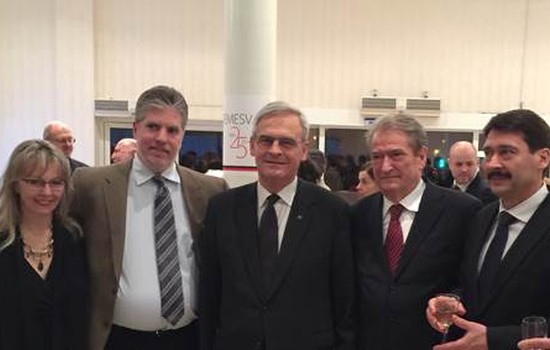Members of the Hungarian American Coalition (Coalition), including Coalition President Max Teleki, Csilla Grauzer, Zsolt Szekeres and Noémi Bánhidi, attended events both in Budapest and Timisoara. The participation of the Coalition delegation in the commemorations was made possible by a generous grant from The Hungary Initiatives Foundation.
Twenty-five years ago on December 16, 1989, a crowd of ethnic Hungarians and Romanians gathered around the Hungarian Reformed Church of Timisoara to prevent Communist officials from forcibly evicting its outspoken anti-regime pastor, László Tőkés, from the building. In the following days, the protests spread to other parts of the Romania and developed into a bloody revolution that swept away the rule of Communist dictator Nicolae Ceaușescu.
This year’s remembrance began on December 15 in Budapest, with a memorial assembly at the Hungarian Academy of Sciences, organized by the Hungarian Parliament and the Pro Minoritate Foundation, and under the patronage of Parliamentary Speaker László Kövér.
The assembly began with a short documentary film entitled “Regime-changing Advent – Timisoara 1989,” followed by welcoming remarks by László Lovász, President of the Hungarian Academy of Sciences.
In the opening address, Prime Minister Viktor Orbán recalled that in 1989 a bright light shone in Timisoara which extended not only to Transylvania, Romania, and Hungary, but also blazed throughout Europe. “A quarter of a century later, the light that shone in the darkness of dictatorship is nowadays sometimes barely visible,” he warned. The Prime Minister pointed out that 25 years later, many are still not willing to accept that the evolution in Romania began at a small Protestant, ethnic Hungarian church, sparking a multi-ethnic movement that desired freedom for all of Romania’s nationalities: Romanians, Hungarians, and Germans.
In his commemorative speech, MEP László Tőkés emphasized that Hungarians within and beyond Hungary’s borders not only have a common past, but they also share a common present and future: “Neither the nation nor history can be torn apart by artificial borders.” The events of Timisoara are part of both Hungarian and Romanian history; both nations united in a common cause for positive change, for all people. Tőkés pointed out that the events of 25 years ago not only ended Communist rule, but also led to “the liberation of peoples living as minorities, and to the beginning of a process toward national unification regardless of borders.”
Coalition President Max Teleki addressed the meeting, emphasizing Hungary’s role in the demolition of the Iron Curtain. He also highlighted the role of MEP László Tőkés, considered the “spark” of the revolution, whose courageous defiance of official, systemic terror triggered anti-Communist demonstrations that led to the fall of the Ceaușescu regime.
Other speakers of the memorial session included: Sali Berisha, former President and Prime Minister of Albania; Mátyás Szűrös, former Interim State President of Hungary; Géza Erdélyi, retired Bishop of the Reformed Church in Slovakia; Frank Spengler, Resident Representative of the Konrad Adenauer Stiftung in Hungary; Sándor Lezsák, Deputy Speaker of the Hungarian Parliament; Mária Wittner, Hungarian Freedom Fighter in 1956, former MP; Florian Mihalcea, President of the Timisoara Society; and Pawel Ukielski, Deputy Director of Warsaw Rising Museum.
On December 17, the Coalition delegation traveled to Timisoara to attend the Memorial Evening at the Regional Development Center of Timisoara, hosted by Attila Balázs, Director of the Csiky Gergely Hungarian State Theater of Timisoara.
.jpg)
Photo: Csilla Grauzer, Max Teleki, László Tőkés, Sali Berisha, President János Áder
The evening began with remarks by guest of honor János Áder, President of Hungary: “Miracles will not happen by themselves... the miracle of redemption will occur only if we make an effort.” The courage of László Tőkés, Áder declared, demonstrated that “even an apparently invincible empire will prove fragile if it is built on lies.”
“For those in Hungary, the Christmas of 1989 evoked their own revolution (of 1956)”, President Áder said. The developments of 1989 created “enormous hopes and expectations” for an end to ethnic tensions and for the emergence of a community based on of freedom, democracy, and human rights.
The speeches were followed by a breathtaking performance of the Hungarian State Folk Ensemble entitled ‘Hungarian Rhapsody’.

On December 18, the Coalition delegation attended a conference entitled “Anno Mirabilis 1989 – Unanswered Questions from a 25-Year Perspective.” The first panel, “Regime Changers on Regime Change,” was moderated by Zsolt Szilágyi, Vice President of the Transylvanian Hungarian People’s Party.
Speaking on the panel, Coalition President Max Teleki said that no one has a monopoly on freedom and truth; no one is the sole possessor of moral authority to carry the torch of democracy. Displaying TIME and Newsweek magazines from 25 years ago, Teleki stressed the need for quality journalism. In our age of instant information, social media and the Internet, he said, politicians feel compelled to respond very quickly; this in turn has an immediate impact on the geopolitical environment. He also pointed out that today’s U.S. policymakers tend to forget that during the Cold War, the U.S. government expressly supported the Ceaușescu regime, regarding it as a “maverick” of the Eastern bloc and a counterbalance to the monolithic regional power of the U.S.S.R. Mr. Teleki declared that today’s Central European states, which have voted overwhelmingly to join Western political and military alliances, ought not to feel caught in the middle anymore.
Other speakers of the first panel included: Mária Filep, organizer of the Pan-European Picnic; Előd Kincses, ethnic Hungarian lawyer; Zoltán Balaton, member of the ’89 Memorial Committee; Béla Győri, broadcast journalist; Imre Borbély, political analyst; Ion Istvan, engineer, participant in the 1989 popular uprising in Timisoara; and Neela Winkelmann, Managing Director of Platform for European Memory and Conscience.
The second panel, “25 Years Later: From the Past into the Future,” was moderated by Tibor T. Toró, President of the Transylvanian Hungarian People’s Party. Speakers were Göran Lindblad, Chair of the Platform for European Memory and Conscience; András Ágoston, former president of the Hungarian Democratic Party of Vojvodina (Serbia); Smaranda Enache, Co-President of the Pro Europa League; Zsolt Németh, MP, Chairman of the Foreign Affairs Committee of the Hungarian Parliament; Miklós Duray, writer, former president of the Hungarian Coalition Party (Slovakia); and Gabriel Andreescu, university professor and human rights activist. A video message was submitted by Tunne Kelam, member of the European Parliament, Estonia.
The memorial week continued with events on December 19 in Timisoara, on December 20 in Oradea; and on November 21 in the village of Mineu (Menyő).
Source: http://www.hacusa.org/en/news/commemorations-mark-25th-anniversary-of-timisoara-uprising
PhotoGallery: https://www.facebook.com/media/set/?set=a.388230338025203.1073741842.270686609779577&type=1



